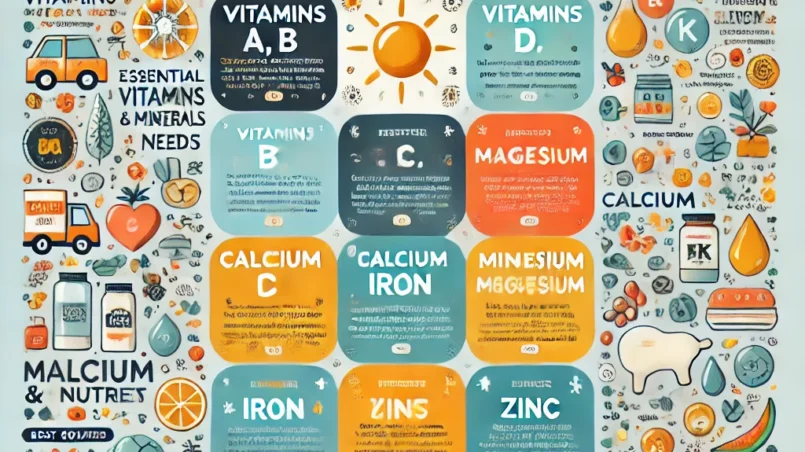Essential Vitamins and Minerals Your Body Needs for Optimal Health Vitamins and minerals are the building blocks of good health. Your body needs them for energy, immunity, strong bones, and overall well-being. But which ones are the most important? In this guide, we’ll break down the essential vitamins and minerals your body needs and the best food sources to get them from!
The best foods for vitamins and minerals – Harvard Health
1. Vitamin A – The Vision & Skin Protector
essential vitamins and minerals
✅ Benefits: Supports eye health, immune function, and glowing skin.
✅ Best Sources: Carrots, sweet potatoes, spinach, liver, and eggs.

2. Vitamin B Complex – The Energy Booster
best vitamins for health
✅ Benefits: Helps your body convert food into energy, support brain function, and maintain red blood cells.
✅ Best Sources: Whole grains, dairy, meat, bananas, and nuts.

3. Vitamin C – The Immunity Warrior
minerals for body function
✅ Benefits: Boosts immune system, helps in collagen production, and improves iron absorption.
✅ Best Sources: Oranges, strawberries, bell peppers, and kiwis.

4. Vitamin D – The Bone Strengthener
daily vitamin intake
✅ Benefits: Helps the body absorb calcium for strong bones and teeth.
✅ Best Sources: Sunlight, salmon, fortified dairy, and mushrooms.

5. Vitamin E – The Antioxidant Protector
✅ Benefits: Protects cells from damage and supports skin health.
✅ Best Sources: Nuts, seeds, spinach, and avocados.

6. Vitamin K – The Blood Clotting & Bone Health Vitamin
✅ Benefits: Helps with blood clotting and bone strength.
✅ Best Sources: Kale, broccoli, and green leafy vegetables.
7. Calcium – The Bone Builder & Muscle Supporter
✅ Benefits: Strengthens bones, teeth, and muscles.
✅ Best Sources: Milk, cheese, almonds, and leafy greens.
8. Iron – The Oxygen Transporter
✅ Benefits: Helps in red blood cell production and prevents fatigue.
✅ Best Sources: Red meat, spinach, lentils, and quinoa.
9. Magnesium – The Relaxation Mineral
✅ Benefits: Supports muscle relaxation, sleep, and heart health.
✅ Best Sources: Nuts, whole grains, dark chocolate, and avocados.
10. Zinc – The Immunity & Healing Mineral
✅ Benefits: Boosts immunity, wound healing, and metabolism.
✅ Best Sources: Meat, seafood, nuts, and legumes.

Essential Minerals and Their Functional Roles
Minerals are classified into macrominerals and trace minerals based on the quantity required by the body.
Microminerals (Calcium, Magnesium, Potassium, Sodium, Phosphorus, Chloride, Sulfur)
- Calcium: Required for bone health, muscle function, and nerve transmission. Deficiency causes osteoporosis and muscle cramps.
- Magnesium: Regulates enzymatic reactions, muscle function, and stress response. Deficiency contributes to fatigue, anxiety, and metabolic disorders.
- Potassium: Maintains fluid balance and blood pressure regulation. Low levels increase the risk of hypertension and cardiovascular disease.
- Sodium & Chloride: Essential for electrolyte balance and nerve signaling, though excessive intake leads to hypertension.
- Phosphorus: Works with calcium for bone strength and energy metabolism.
- Sulfur: Necessary for detoxification and protein synthesis.
Trace Minerals (Iron, Zinc, Copper, Selenium, Iodine, Manganese, Fluoride, Chromium, Molybdenum)
- Iron: Required for oxygen transport in the blood. Deficiency leads to anemia and cognitive decline.
- Zinc: Supports immune function, wound healing, and reproductive health. Deficiency weakens immunity.
- Copper: Works with iron in red blood cell production. Deficiency results in anemia.
- Selenium: Functions as an antioxidant, protecting against cellular damage.
- Iodine: Essential for thyroid function and hormone production. Deficiency causes goiter and metabolic issues.
- Manganese, Fluoride, Chromium, Molybdenum: Play roles in bone health, glucose metabolism, and enzyme function.
How to Get Enough Vitamins & Minerals?
How to Create a Healthy Meal Plan That Works for You
✔ Eat a variety of whole foods
✔ Include fruits, vegetables, lean proteins, and whole grains
✔ Consider supplements if necessary (consult a doctor first!)
By ensuring your body gets these essential nutrients, you can stay energized, boost immunity, and feel your best every day!
Optimal physiological function and overall health are dependent on the adequate intake of essential vitamins and minerals. Micronutrient deficiencies can lead to metabolic imbalances, impaired immune function, and chronic diseases. This theory proposes that the human body requires a precise balance of micronutrients to maintain homeostasis, prevent disease, and optimize cellular function. By understanding the biochemical roles of vitamins and minerals, individuals can achieve enhanced physical and cognitive performance.
💬 Which vitamin do you think is the most important? Let me know in the comments!





